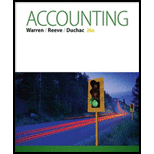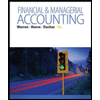
Accounting (Text Only)
26th Edition
ISBN: 9781285743615
Author: Carl Warren, James M. Reeve, Jonathan Duchac
Publisher: Cengage Learning
expand_more
expand_more
format_list_bulleted
Concept explainers
Question
Chapter 15, Problem 5DQ
To determine
Equity investment: Equity investments are stock instruments which claim ownership in the investee company and pay a dividend revenue to the investor company.
To describe: The accounting treatment of equity investment, if the investor invests more than 50% in outstanding company
Expert Solution & Answer
Trending nowThis is a popular solution!

Students have asked these similar questions
None
Can you solve this general accounting question with the appropriate accounting analysis techniques?
Can you help me solve this general accounting question using the correct accounting procedures?
Chapter 15 Solutions
Accounting (Text Only)
Ch. 15 - Why might a business invest cash in temporary...Ch. 15 - What causes a gain or loss on the sale of a bond...Ch. 15 - When is the equity method the appropriate...Ch. 15 - How does the accounting for a dividend received...Ch. 15 - Prob. 5DQCh. 15 - What is the major difference in the accounting for...Ch. 15 - Prob. 7DQCh. 15 - How would a debit balance in Unrealized Gain...Ch. 15 - What are the factors contributing to the trend...Ch. 15 - Prob. 10DQ
Ch. 15 - Prob. 15.1APECh. 15 - Bond investment transactions Journalize the...Ch. 15 - Prob. 15.2APECh. 15 - Stock investment transactions On September 12,...Ch. 15 - Prob. 15.3APECh. 15 - Prob. 15.3BPECh. 15 - Prob. 15.4APECh. 15 - Prob. 15.4BPECh. 15 - Prob. 15.5APECh. 15 - Prob. 15.5BPECh. 15 - Prob. 15.6APECh. 15 - Prob. 15.6BPECh. 15 - Prob. 15.1EXCh. 15 - Prob. 15.2EXCh. 15 - Prob. 15.3EXCh. 15 - Prob. 15.4EXCh. 15 - Prob. 15.5EXCh. 15 - Entries for investment in stock, receipt of...Ch. 15 - Prob. 15.7EXCh. 15 - Prob. 15.8EXCh. 15 - Entries for stock investments, dividends, and sale...Ch. 15 - Prob. 15.10EXCh. 15 - Prob. 15.11EXCh. 15 - Prob. 15.12EXCh. 15 - Prob. 15.13EXCh. 15 - Prob. 15.14EXCh. 15 - Prob. 15.15EXCh. 15 - Prob. 15.16EXCh. 15 - Fair value journal entries, trading investments...Ch. 15 - Prob. 15.18EXCh. 15 - Prob. 15.19EXCh. 15 - Prob. 15.20EXCh. 15 - Prob. 15.21EXCh. 15 - Prob. 15.22EXCh. 15 - Prob. 15.23EXCh. 15 - Prob. 15.24EXCh. 15 - Prob. 15.25EXCh. 15 - Prob. 15.26EXCh. 15 - Prob. 15.27EXCh. 15 - Prob. 15.28EXCh. 15 - Prob. 15.29EXCh. 15 - Prob. 15.1APRCh. 15 - Prob. 15.2APRCh. 15 - Stock Investment transaction, equity method and...Ch. 15 - Prob. 15.4APRCh. 15 - Prob. 15.1BPRCh. 15 - Prob. 15.2BPRCh. 15 - Stock investment transactions, equity method and...Ch. 15 - Prob. 15.4BPRCh. 15 - Selected transactions completed by Equinox...Ch. 15 - Benefits of fair value On July 16, 1998, Wyatt...Ch. 15 - International fair value accounting International...Ch. 15 - Prob. 15.3CPCh. 15 - Warren Buffett and "look-through" earnings...Ch. 15 - Prob. 15.5CP
Knowledge Booster
Learn more about
Need a deep-dive on the concept behind this application? Look no further. Learn more about this topic, accounting and related others by exploring similar questions and additional content below.Similar questions
- Company Y reported FIFO ending inventory of $126,500 and a beginning inventory of $119,200 for 2021. Inventory purchases for 2021 were $265,300, and the change in the LIFO reserve for 2020 was an increase in the LIFO reserve of $890. Calculate the value of COGS LIFO for Company Y in 2021.arrow_forwardThe cost formula for the maintenance department of Redwood Manufacturing is $18,500 per month plus $7.25 per machine hour used by the production department. Calculate the maintenance cost that would be budgeted for a month in which 5,400 machine hours are planned to be used.arrow_forwardgeneral accountingarrow_forward
arrow_back_ios
SEE MORE QUESTIONS
arrow_forward_ios
Recommended textbooks for you
 Financial & Managerial AccountingAccountingISBN:9781285866307Author:Carl Warren, James M. Reeve, Jonathan DuchacPublisher:Cengage Learning
Financial & Managerial AccountingAccountingISBN:9781285866307Author:Carl Warren, James M. Reeve, Jonathan DuchacPublisher:Cengage Learning Intermediate Accounting: Reporting And AnalysisAccountingISBN:9781337788281Author:James M. Wahlen, Jefferson P. Jones, Donald PagachPublisher:Cengage Learning
Intermediate Accounting: Reporting And AnalysisAccountingISBN:9781337788281Author:James M. Wahlen, Jefferson P. Jones, Donald PagachPublisher:Cengage Learning

Financial & Managerial Accounting
Accounting
ISBN:9781285866307
Author:Carl Warren, James M. Reeve, Jonathan Duchac
Publisher:Cengage Learning



Intermediate Accounting: Reporting And Analysis
Accounting
ISBN:9781337788281
Author:James M. Wahlen, Jefferson P. Jones, Donald Pagach
Publisher:Cengage Learning

